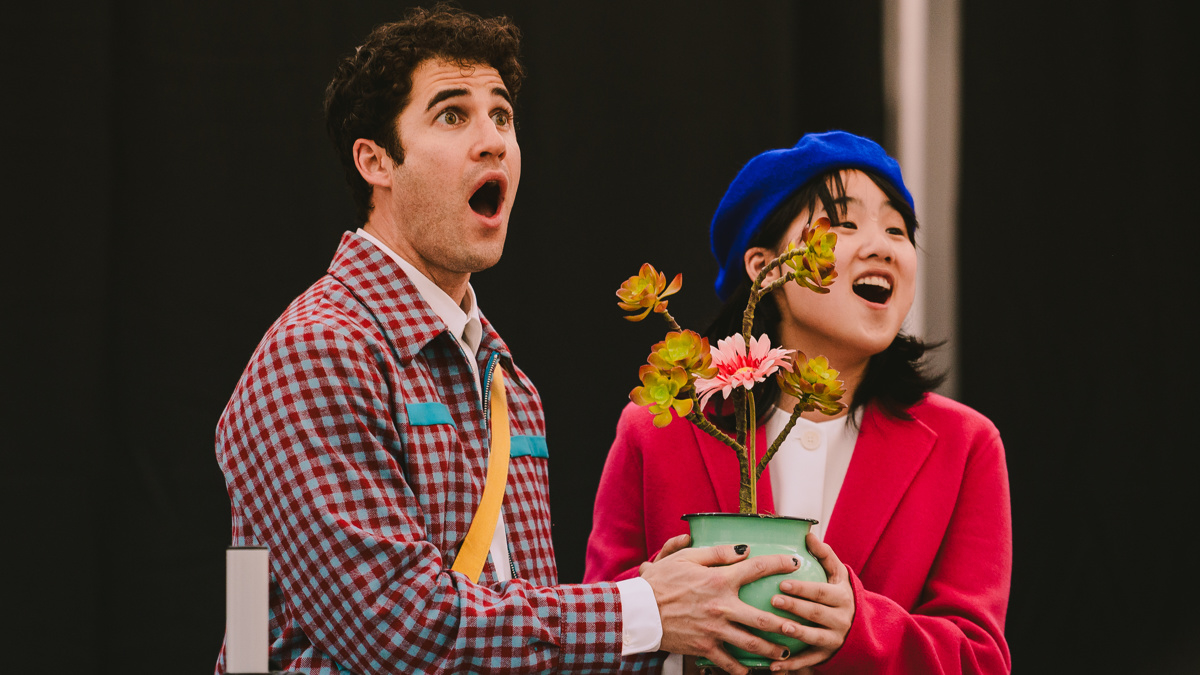MAYBE HAPPY ENDING
Music by Will Aronson Lyrics by Hue Park
Book by Aronson and Park
Directed by Michael Arden
Starring Darren Criss, Helen J. Chen and Marcus Choi
Belasco Theatre
Official Website
Reviewed by David Spencer
I don’t know anyone (including myself) who hasn’t been charmed by Maybe Happy Ending and it deserves all the praise and healthy attendance coming its way. I want to start with that, because I’m now going to approach it from an angle that at first might seem as if I think otherwise.
I attended deliberately not knowing anything much about it. Thus it surprised me, story-wise, only twice. And that was when the curtain rose on Oliver (Darren Criss) starting the routine of his day, and clocking his makeup and his body movements, I thought: Oh, my goodness. He’s a robot. The second surprise came shortly thereafter, with the appearance of his neighbor robot Claire in distress because her battery is running down and her charger is malfunctioning, and the realization that the geographical setting of this future tale is Korea. (As written, Claire need not necessarily be an Asian actress, but the casting of Helen J. Shen boosts the verisimilitude of our being in what is now the third largest electronics-producing country in the world—which may be tacitly ahead of even that in the future-set narrative.)
Beyond that, I was not surprised because, as a lifelong aficionado of science fiction, and having toiled in its fields as both musical dramatist (Weird Romance) and author (Passing Fancy, an original tie-in novel based on the TV series Alien Nation), I’m perhaps over-familiar with many of the basic tropes and concepts, and I could see the path it was going to take. The only thing I’ll reveal here is that the opening encounter between Oliver and Claire is a clever variation on the classic “meet cute” of romantic comedy. So we know early that this is going to be—despite the red herring of being technologically impossible—a love story. And I pull back because if any of you know the tropes, a few too many clues will give away the game.
Basic tropes and concepts are not necessarily cliches, though—treatment is everything—and what keeps Maybe Happy Ending afloat, cozy, warm, lovable and interesting, even if you can see the path ahead, is that the creative team respects the genre. They love science fiction. They know it, they get it and at no time do they fall into the depressingly common musical theatre reflex of trying to parody it (which usually happens with little or no true affinity for SF whatsoever).
Now, there were surprises for me above and beyond the story trajectory. Among them: the co-librettists, who are also the songwriting team, Will Aronson (music) and Hue Park, have created a delicately intricate language for the piece, just modern enough to be futuristic, rarely if ever atonal, always highly literate, yet never in the way of the simple story. There are only four actors: additional roles are played by Marcus Choi and Dez Duron. And, the magic trick holding it all together, director Michael Aren and his design crew have devised a presentation that is very high tech; lots of projections, scenic effects, special effects—and sound design to match. Yet never does it overwhelm. I don’t think the theatre has ever seen this level of technological sophistication balanced with fragile intimacy.
And again, there’s the factor of charm, fueled by built-in contradictions: Darren Criss’ more advanced-model Oliver is an introvert trapped by routine; Helen J. Shen’s Claire, an ironically obsolete model, is the free spirit who can penetrate his shell. With other dualities to come. Which tacitly takes us into an exploration of AI and its unanticipated authentically human potential. Which exemplifies the key to musicalizing science fiction—well, any genre, really, but especially science fiction, which is so often idea driven rather than character driven. Which is that the central character (in this case the central couple) has to embody the idea. Concept and character have to be inextricable.
Maybe such understanding seeming so effortless is generational. Indulge me a personal anecdote toward the point, one I’ve never told (anyone, anywhere) before:
My show Weird Romance (written in collaboration with Alan Menken and Alan Brennert) strove just as assiduously to take science fiction seriously (albeit not solemnly), an intention we—and I in particular, regularly—always made very clear. Yet there came an early evening when one of the administrative staff at its debut theatre called me to read the newly composed press release. That I thought had come from the press agent’s office. I don’t remember the exact wording of the show description, but it went something like “Wild and wacky, zippy-zappy space-age fun in the futuristic world of love!” And I blurted, without thinking, “Who the hell wrote that?”
The dead silence that greeted my expostulation made it dreadfully clear that she had. And almost worse, that in spite of knowing the show, a serious-minded approach to musical science fiction was an oxymoron to her. I did my best to soothe feelings, explained the needed approach, she asked me if I’d prefer writing it myself, since the tone had to be so specific, and, masking the exclamation point, diffidently mumbled that yeah, that would be an agreeable solution.
But that was over 30 years ago. And however much in the Zeitgeist science fiction may have been then, that’s nothing to where it is now, in a universe dominated by technology. (I say in a review I began on my Android tablet in one location in Mobi Office Suite, and picked up on my iMac in another, using Microsoft Word, because both devices have access to Dropbox, where I now store ongoing work.)
There’s no such misperception anywhere near Maybe Happy Ending. It’s just a perfectly balanced synthesis. Finally on Broadway. And about time.
